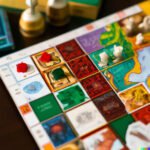Board games have been a beloved pastime for generations, offering a mix of entertainment, social interaction, and intellectual challenge. In this article, we will delve into the world of board games and explore strategies to win. Whether you’re a casual player looking to improve your skills or a competitive gamer aiming for victory, understanding strategic gameplay is key to success.
Strategy plays a crucial role in board games, as it involves making calculated decisions to outsmart opponents and achieve your objectives. By honing your strategic thinking skills, you can enhance your chances of winning and enjoy a more fulfilling gaming experience. From analyzing game components to adapting to different playing styles, there are numerous ways to develop an effective game plan that can lead you to victory.
In the following sections, we will discuss the importance of strategy in board games, break down different genres of board games and their strategic elements, provide practical tips for developing a winning strategy, examine specific strategies for popular games like Chess and Monopoly, explore the influence of luck on gameplay, and offer insights on adjusting your strategy based on the dynamics of the game.
So roll the dice, draw your cards, and get ready to elevate your gameplay with strategic prowess.
Why Strategy Matters in Board Games
When it comes to board games, strategy plays a crucial role in determining the outcome of the game. Whether you are playing a classic game like Chess or a modern board game like Settlers of Catan, having a well-thought-out strategy can give you an edge over your opponents.
Strategic thinking involves analyzing the game situation, anticipating your opponent’s moves, and making decisions that will help you achieve your goals. By understanding the importance of strategic thinking, players can improve their gameplay and increase their chances of winning.
Benefits of Strategic Thinking
Strategic thinking in board games not only enhances the overall gaming experience but also helps players develop critical thinking skills. It encourages players to think ahead, consider multiple options, and evaluate the consequences of their decisions. By engaging in strategic planning during gameplay, players can improve their problem-solving abilities and enhance their decision-making skills. Additionally, strategic thinking fosters creativity and adaptability as players learn to adjust their strategies based on changing game conditions.
Elements of Strategic Thinking
Effective strategies in board games involve various elements that players need to consider. One key element is understanding the objectives of the game and devising a plan to achieve them efficiently. Players must also assess the strengths and weaknesses of their position on the board, as well as those of their opponents, to determine the best course of action.
Evaluating risk versus reward is another critical aspect of strategic thinking, as players must decide when to take calculated risks or play it safe to secure victory. By mastering these elements of strategic thinking, players can elevate their gameplay and increase their chances of success in board games.
Overall, grasping the significance of strategic thinking in board games is essential for anyone looking to enhance their gameplay and compete at a higher level. By developing effective strategies and honing strategic thinking skills, players can approach each game with confidence and increase their chances of winning. Whether you are a beginner learning the ropes or a seasoned player looking to up your game, incorporating strategic thinking into your gameplay will undoubtedly lead to more rewarding and competitive gaming experiences.
Types of Board Games
Board games come in a variety of genres, each offering unique gameplay experiences and strategic challenges. Understanding the different types of board games can help players better tailor their strategies to fit the specific mechanics and objectives of each game. Here are some common genres of board games and the strategic elements they typically involve:
- Strategy Games: Strategy games focus on long-term planning, resource management, and outwitting opponents through tactical moves. Examples include Settlers of Catan and Ticket to Ride.
- Deck-Building Games: In deck-building games, players construct their decks throughout the game to optimize their choices and develop winning strategies. Games like Dominion and Star Realms fall into this genre.
- Cooperative Games: Cooperative board games require players to work together towards a common goal, often strategizing as a team to overcome challenges. Pandemic and Forbidden Island are popular examples.
Understanding the strategic elements of each genre can be instrumental in developing effective strategies to win board games. Whether you prefer intense strategy, deck optimization, or collaboration with your fellow players, there is a board game genre suited to your preferences.
In addition to considering the genre of a board game, analyzing the specific components within each game can also provide valuable insights into crafting successful strategies. By understanding how elements like dice, cards, and game boards influence gameplay, players can make informed decisions that increase their chances of victory. Learning how to leverage these components strategically is key to mastering any board game and emerging victorious in competitive gaming sessions.
Analyzing Game Components
Board games are not just about moving tokens or rolling dice; they are strategic playgrounds where players must carefully navigate their choices to come out victorious. Understanding the role of game components like dice, cards, and game boards is crucial in developing effective strategies to win board games. These components not only add complexity and depth to gameplay but also serve as tools that can be leveraged to outmaneuver opponents.
Dice, a common component found in many board games, introduce an element of chance that can either work in your favor or throw a wrench in your plans. While luck plays a significant role when rolling dice, skilled players know how to mitigate its impact by analyzing probabilities and making calculated decisions based on possible outcomes.
For example, in a game where high numbers are advantageous, players may strategize around increasing their chances of rolling those numbers through various means within the game mechanics.
Cards often provide players with unique abilities, resources, or opportunities that can tip the scales in their favor if used strategically. Whether it’s collecting powerful cards to build an arsenal for later use or strategically playing cards at the right moment to thwart opponents’ plans, understanding the card dynamics of a board game is essential for crafting winning strategies.
Players who can anticipate their opponents’ moves based on the cards they hold and adapt their strategy accordingly have a better chance of emerging victorious in competitive gameplay.
Game boards serve as the canvas on which players make their moves and execute their strategies. From creating chokepoints to control access routes to strategically placing pieces for optimal positioning, the layout of the game board influences every decision made by players.
Analyzing the spatial relationships between different areas of the board, identifying key locations for resource gathering or point accumulation, and adapting your strategy based on changing board states are fundamental aspects of mastering games that heavily rely on positional play.
| Component | Role in Strategy |
|---|---|
| Dice | Introduce an element of chance that requires players to analyze probabilities and make calculated decisions. |
| Cards | Provide unique abilities and resources that can be strategically used to outmaneuver opponents and seize advantages. |
| Game Boards | Serve as the spatial environment where players execute their strategies by controlling access routes, positioning pieces strategically, and adapting tactics based on changing conditions. |
Tips for Developing a Winning Strategy
Developing a winning strategy is crucial when playing board games, as it can greatly increase your chances of success and enjoyment. One of the key strategies to win board games is to familiarize yourself with the rules and objectives of the game. Understanding how each component works together and knowing the goals you need to achieve will give you a solid foundation for developing your strategy.
Another important aspect of developing a winning strategy is to observe your opponents. Pay attention to their moves, tendencies, and reactions during gameplay. By studying their behavior, you can anticipate their next moves and plan your strategy accordingly. Additionally, being aware of your opponents’ strengths and weaknesses can help you formulate a strategy that plays to your strengths while exploiting their vulnerabilities.
Furthermore, adaptability is essential in developing a winning strategy in board games. Being flexible in your approach and willing to adjust your tactics based on changing circumstances or new information will give you an edge over less adaptable players. Remember that no strategy is foolproof, and being able to pivot when necessary can lead to better outcomes in the game.
| Key Strategy | Impact |
|---|---|
| Familiarize with rules | Increases chances of success |
| Observe opponents | Anticipate moves and plan accordingly |
| Adaptability | Flexibility for better outcomes |
Strategies for Classic Board Games
Board games have been a popular pastime for centuries, offering endless entertainment and intellectual challenge to players of all ages. Strategy plays a crucial role in determining the outcome of these games, as it involves making decisions and planning ahead to outsmart opponents.
Whether you are a casual player or a serious competitor, having effective strategies in your arsenal can greatly increase your chances of winning. In this section, we will delve into specific strategies for some classic board games like Chess, Monopoly, and Scrabble.
When it comes to Chess, considered by many as the ultimate strategy game, developing a solid opening repertoire is key to gaining an early advantage over your opponent. By studying common opening moves and their variations, you can set the tone of the game and potentially control the flow of play.
Additionally, controlling the center of the board is crucial in Chess as it allows greater mobility for your pieces and gives you more options for launching attacks or defending against threats.
In Monopoly, one of the most iconic board games in history, acquiring properties strategically is essential for building wealth and bankrupting your opponents. One effective strategy is to focus on obtaining complete color sets early in the game to maximize rent collection from other players landing on your properties. Investing in houses and hotels strategically can also significantly increase your income and put financial pressure on rival players.
Scrabble, a word game that challenges players’ vocabulary and strategic thinking skills, requires careful planning and foresight to maximize scoring opportunities with limited letter tiles. Building words on premium squares like double or triple word score spaces can exponentially boost your point total.
Additionally, keeping track of high-value letters like Q, Z, X, J can give you an edge in creating words with maximum point potential. Remember that blocking opponents from forming high-scoring words while expanding your own scoring opportunities is key to dominating the board.
By implementing these specific strategies tailored for each classic board game, you can enhance your overall gameplay experience and increase your chances of victory. As you continue honing your skills and adapting strategies to suit different opponents’ styles, you will become a formidable player capable of conquering any board game challenge that comes your way.
So next time you gather around the table for a friendly game night session with friends or family, remember these tips and put them into practice to emerge victorious in classic board games like Chess, Monopoly.
Adapting to Different Players
When it comes to playing board games, one of the key factors that can determine your success is how well you adapt your strategy to the playing styles of your opponents. Each player brings a unique approach and preferences to the game, making it essential to be able to assess and adjust your tactics accordingly. By understanding the different types of players you may encounter, you can tailor your strategy to increase your chances of winning.
One important aspect to consider when adapting to different players is their level of experience with the game. Beginners may approach the game more cautiously, while seasoned veterans may take more risks or employ advanced strategies. By gauging the skill level of your opponents early on, you can adjust your gameplay accordingly – whether it’s by playing aggressively against beginners or adopting a more strategic approach against experienced players.
Additionally, understanding the preferred playing style of each opponent can give you valuable insight into how they approach decision-making in the game. Some players may be more conservative and focus on building up their resources slowly, while others may be aggressive and seek immediate advantages.
By observing their actions and tendencies during gameplay, you can adapt your strategy to either counter their moves or exploit their weaknesses effectively. Flexibility and adaptability are key in adjusting your gameplay based on the playing styles of your opponents in order to come out victorious.
The Role of Luck in Board Games
Luck plays a significant role in board games, adding an element of unpredictability that can either make or break a player’s strategy. While strategic thinking is crucial for success in board games, it is also important to acknowledge the impact that luck can have on the outcome of the game. In this section, we will delve into how luck influences strategy in board games and explore some techniques for minimizing its impact.
Understanding Luck in Board Games
Luck in board games can manifest in various forms, such as drawing cards from a shuffled deck, rolling dice to determine movement or outcomes, or even the initial setup of the game. Players may find themselves at the mercy of chance, with their carefully crafted strategies falling apart due to an unlucky draw or roll. This randomness adds an exciting and unpredictable element to board games but can also be frustrating for those who prefer more control over their gameplay.
Mitigating the Impact of Luck
While luck cannot be completely eliminated from board games, there are ways to mitigate its impact on strategic gameplay. One approach is to diversify your strategies and remain flexible so that you can adapt to unexpected outcomes caused by luck. Additionally, focusing on long-term goals rather than immediate gains can help offset any setbacks resulting from unlucky events.
Furthermore, understanding probabilities and making calculated decisions based on likely outcomes can help players navigate through uncertain situations. By incorporating these tactics into your gameplay, you can better handle the unpredictable nature of luck in board games and increase your chances of success.
Conclusion
In conclusion, understanding and implementing strategies to win board games can greatly enhance the enjoyment and competitiveness of the gaming experience. By delving into the world of board games, players can explore a wide variety of genres and game components that require strategic thinking to succeed. Whether it’s analyzing the role of dice, cards, or game boards, knowing how to develop a winning strategy is crucial in outmaneuvering opponents and claiming victory.
Furthermore, by examining specific strategies for classic board games like Chess, Monopoly, and Scrabble, players can gain valuable insights into different gameplay approaches and tactics. Adapting to the playing styles of various opponents is also essential in staying ahead of the competition and adjusting one’s strategy accordingly. Additionally, acknowledging the role of luck in board games and learning how to mitigate its impact through strategic planning can make a significant difference in determining the outcome of each game.
As readers continue their journey into the world of board games, it is important to remember that strategic thinking is a key component in achieving success on the tabletop. By incorporating tips and advice for developing winning strategies, players can elevate their gameplay skills and increase their chances of emerging victorious. So next time you gather around for a friendly game night with friends or family, remember to apply these strategies to win board games effectively and enjoyably.
Frequently Asked Questions
How Do You Win the Board Game Go?
Winning in the board game Go requires a combination of strategic placement and territorial control. Players aim to surround their opponent’s pieces while protecting their own, ultimately capturing more territory on the board to secure victory.
What Is Board Game Strategy?
Board game strategy refers to the overall plan or approach that a player takes to achieve victory. This can involve decision-making, predicting opponents’ moves, adapting to changing circumstances, and maximizing one’s own resources or advantages within the confines of the game.
What Is the Best Strategy Board Game of All Time?
Determining the best strategy board game of all time is subjective and depends on personal preferences. However, some popular choices among enthusiasts include classics like Chess, Go, Risk, and Settlers of Catan. Each offers unique challenges and require various tactics to succeed.

I love playing all kinds of games – from classics like Monopoly to modern favourites like Ticket to Ride.
I created this blog as a way to share my love of board games with others, and provide information on the latest releases and news in the industry.





